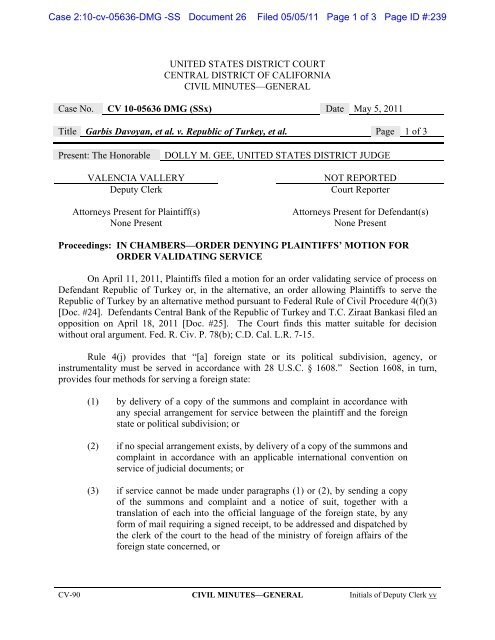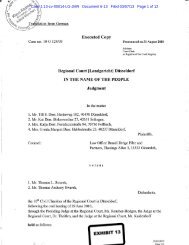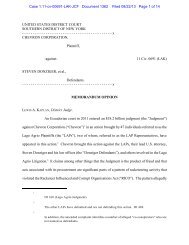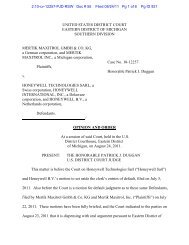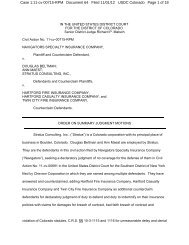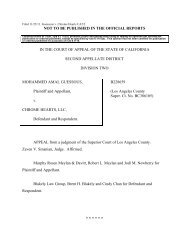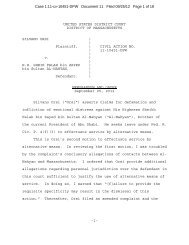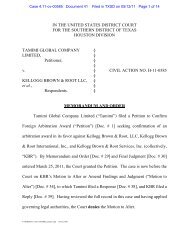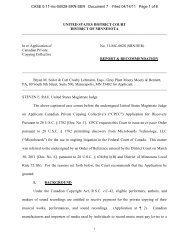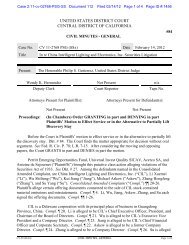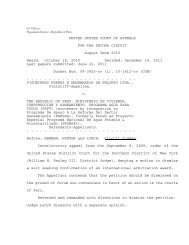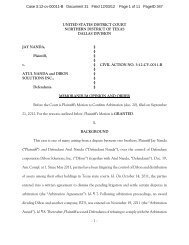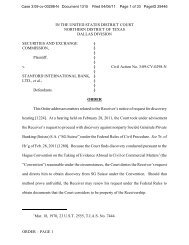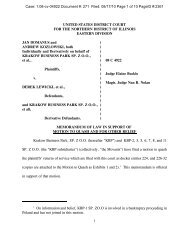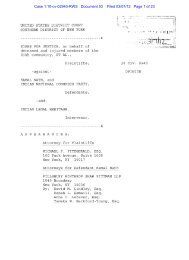Davoyan v. Republic of Turkey - Letters Blogatory
Davoyan v. Republic of Turkey - Letters Blogatory
Davoyan v. Republic of Turkey - Letters Blogatory
Create successful ePaper yourself
Turn your PDF publications into a flip-book with our unique Google optimized e-Paper software.
Case 2:10-cv-05636-DMG -SS Document 26 Filed 05/05/11 Page 1 <strong>of</strong> 3 Page ID #:239<br />
UNITED STATES DISTRICT COURT<br />
CENTRAL DISTRICT OF CALIFORNIA<br />
CIVIL MINUTES—GENERAL<br />
Case No. CV 10-05636 DMG (SSx) Date May 5, 2011<br />
Title Garbis <strong>Davoyan</strong>, et al. v. <strong>Republic</strong> <strong>of</strong> <strong>Turkey</strong>, et al. Page 1 <strong>of</strong> 3<br />
Present: The Honorable DOLLY M. GEE, UNITED STATES DISTRICT JUDGE<br />
VALENCIA VALLERY NOT REPORTED<br />
Deputy Clerk Court Reporter<br />
Attorneys Present for Plaintiff(s) Attorneys Present for Defendant(s)<br />
None Present None Present<br />
Proceedings: IN CHAMBERS—ORDER DENYING PLAINTIFFS’ MOTION FOR<br />
ORDER VALIDATING SERVICE<br />
On April 11, 2011, Plaintiffs filed a motion for an order validating service <strong>of</strong> process on<br />
Defendant <strong>Republic</strong> <strong>of</strong> <strong>Turkey</strong> or, in the alternative, an order allowing Plaintiffs to serve the<br />
<strong>Republic</strong> <strong>of</strong> <strong>Turkey</strong> by an alternative method pursuant to Federal Rule <strong>of</strong> Civil Procedure 4(f)(3)<br />
[Doc. #24]. Defendants Central Bank <strong>of</strong> the <strong>Republic</strong> <strong>of</strong> <strong>Turkey</strong> and T.C. Ziraat Bankasi filed an<br />
opposition on April 18, 2011 [Doc. #25]. The Court finds this matter suitable for decision<br />
without oral argument. Fed. R. Civ. P. 78(b); C.D. Cal. L.R. 7-15.<br />
Rule 4(j) provides that “[a] foreign state or its political subdivision, agency, or<br />
instrumentality must be served in accordance with 28 U.S.C. § 1608.” Section 1608, in turn,<br />
provides four methods for serving a foreign state:<br />
(1) by delivery <strong>of</strong> a copy <strong>of</strong> the summons and complaint in accordance with<br />
any special arrangement for service between the plaintiff and the foreign<br />
state or political subdivision; or<br />
(2) if no special arrangement exists, by delivery <strong>of</strong> a copy <strong>of</strong> the summons and<br />
complaint in accordance with an applicable international convention on<br />
service <strong>of</strong> judicial documents; or<br />
(3) if service cannot be made under paragraphs (1) or (2), by sending a copy<br />
<strong>of</strong> the summons and complaint and a notice <strong>of</strong> suit, together with a<br />
translation <strong>of</strong> each into the <strong>of</strong>ficial language <strong>of</strong> the foreign state, by any<br />
form <strong>of</strong> mail requiring a signed receipt, to be addressed and dispatched by<br />
the clerk <strong>of</strong> the court to the head <strong>of</strong> the ministry <strong>of</strong> foreign affairs <strong>of</strong> the<br />
foreign state concerned, or<br />
CV-90 CIVIL MINUTES—GENERAL Initials <strong>of</strong> Deputy Clerk vv
Case 2:10-cv-05636-DMG -SS Document 26 Filed 05/05/11 Page 2 <strong>of</strong> 3 Page ID #:240<br />
UNITED STATES DISTRICT COURT<br />
CENTRAL DISTRICT OF CALIFORNIA<br />
CIVIL MINUTES—GENERAL<br />
Case No. CV 10-05636 DMG (SSx) Date May 5, 2011<br />
Title Garbis <strong>Davoyan</strong>, et al. v. <strong>Republic</strong> <strong>of</strong> <strong>Turkey</strong>, et al. Page 2 <strong>of</strong> 3<br />
(4) if service cannot be made within 30 days under paragraph (3), by sending<br />
two copies <strong>of</strong> the summons and complaint and a notice <strong>of</strong> suit, together<br />
with a translation <strong>of</strong> each into the <strong>of</strong>ficial language <strong>of</strong> the foreign state, by<br />
any form <strong>of</strong> mail requiring a signed receipt, to be addressed and<br />
dispatched by the clerk <strong>of</strong> the court to the Secretary <strong>of</strong> State in<br />
Washington, District <strong>of</strong> Columbia, to the attention <strong>of</strong> the Director <strong>of</strong><br />
Special Consular Services--and the Secretary shall transmit one copy <strong>of</strong><br />
the papers through diplomatic channels to the foreign state and shall send<br />
to the clerk <strong>of</strong> the court a certified copy <strong>of</strong> the diplomatic note indicating<br />
when the papers were transmitted.<br />
28 U.S.C. § 1608(a). These four methods are listed in descending order <strong>of</strong> preference. Peterson<br />
v. Islamic <strong>Republic</strong> Of Iran, 627 F.3d 1117, 1129 n.4 (9th Cir. 2010).<br />
Both the United States and the <strong>Republic</strong> <strong>of</strong> <strong>Turkey</strong> are signatories to the Convention on<br />
the Service Abroad <strong>of</strong> Judicial and Extrajudicial Documents in Civil or Commercial Matters<br />
(“Hague Service Convention” or “Convention”), opened for signature Nov. 15, 1965, 20 U.S.T.<br />
361, 658 U.N.T.S. 163. See Hague Service Convention Status Table, http://www.hcch.net/<br />
index_en.php?act=conventions.status&cid=17 (last visited Apr. 16, 2010). The Hague Service<br />
Convention applies to service on a foreign sovereign defendant. See Sabbithi v. Al Saleh, 623 F.<br />
Supp. 2d 93, 98 n.4 (D.D.C. 2009).<br />
The Convention requires each member state to establish a central authority that receives<br />
requests for service <strong>of</strong> documents from other countries. Upon receipt <strong>of</strong> a request in the proper<br />
form, a central authority must serve the documents by a method prescribed by the receiving<br />
state’s internal law or by a method designated by the requester and compatible with that law.<br />
The central authority must then provide the requester with a certificate <strong>of</strong> service that conforms<br />
to a specified model. Volkswagenwerk Aktiengesellschaft v. Schlunk, 486 U.S. 694, 698-99, 108<br />
S.Ct. 2104, 100 L.Ed.2d 722 (1988) (citing Hague Service Convention arts. 2, 5, 6).<br />
A signatory to the Convention may refuse to comply with a request for service “only if it<br />
deems that compliance would infringe its sovereignty or security.” Hague Service Convention,<br />
art. 13. In that case, the state’s central authority “shall . . . promptly inform the applicant and<br />
state the reasons for the refusal.” Id.<br />
Plaintiffs provided a translated version <strong>of</strong> the summons and complaint to <strong>Turkey</strong>’s central<br />
authority in December 2010. (Jabagchourian Decl. 4.) In a letter dated January 4, 2011, the<br />
CV-90 CIVIL MINUTES—GENERAL Initials <strong>of</strong> Deputy Clerk vv
Case 2:10-cv-05636-DMG -SS Document 26 Filed 05/05/11 Page 3 <strong>of</strong> 3 Page ID #:241<br />
UNITED STATES DISTRICT COURT<br />
CENTRAL DISTRICT OF CALIFORNIA<br />
CIVIL MINUTES—GENERAL<br />
Case No. CV 10-05636 DMG (SSx) Date May 5, 2011<br />
Title Garbis <strong>Davoyan</strong>, et al. v. <strong>Republic</strong> <strong>of</strong> <strong>Turkey</strong>, et al. Page 3 <strong>of</strong> 3<br />
<strong>Republic</strong> <strong>of</strong> <strong>Turkey</strong> refused service on sovereign immunity grounds pursuant to Article 13. 1 (Id.,<br />
Ex. A.)<br />
Plaintiffs maintain that they have strictly complied with 28 U.S.C. § 1608(a). The Court<br />
assumes that no special arrangement for service exists between Plaintiffs and the <strong>Republic</strong> <strong>of</strong><br />
<strong>Turkey</strong>, 2 and thus that subsection (a)(1) does not apply. Plaintiffs have not effected service<br />
pursuant to subsection (a)(2) because the <strong>Republic</strong> <strong>of</strong> <strong>Turkey</strong> refused service under the<br />
applicable convention.<br />
To the extent Plaintiffs ask the Court to rule that the <strong>Republic</strong> <strong>of</strong> <strong>Turkey</strong> wrongfully<br />
denied service pursuant to Article 13, the Court lacks jurisdiction to consider that issue. The<br />
Convention is clear that “[d]ifficulties which may arise in connection with the transmission <strong>of</strong><br />
judicial documents for service shall be settled through diplomatic channels.” Hague Service<br />
Convention art. 14. Moreover, as a practical matter, the Court cannot compel the <strong>Republic</strong> <strong>of</strong><br />
<strong>Turkey</strong> to accept service.<br />
There is no evidence that Plaintiffs have attempted to comply with 28 U.S.C. §<br />
1608(a)(3) or (a)(4). Nor can the Court authorize service by alternative methods under Rule<br />
4(f)(3). Rule 4(f) applies only to individuals. A foreign state “must be served in accordance<br />
with 28 U.S.C. § 1608.” Fed. R. Civ. P. 4(j)(1) (emphasis added).<br />
Accordingly, Plaintiffs’ motion for order validating service is DENIED.<br />
IT IS SO ORDERED.<br />
1 The letter was addressed to the U.S. Department <strong>of</strong> Justice, which transmitted a copy to Plaintiffs.<br />
2 Plaintiffs sent a copy <strong>of</strong> the summons and complaint to the Turkish embassy in Washington D.C., which<br />
refused to accept delivery. (Jabagchourian Decl. 2.) Plaintiffs’ attempt at personal service at the Turkish embassy<br />
was also unsuccessful. (See id. 3.)<br />
CV-90 CIVIL MINUTES—GENERAL Initials <strong>of</strong> Deputy Clerk vv


